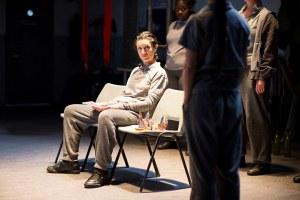Henry IV - RSC 2014
The RSC is returning to its former home the Barbican in November to bring its recent Stratford double bill of Henry IV Parts I and II to London, starring Jasper Britton in the title role and Antony Sher as Falstaff. Each part is billed as running at 2 hours 45 minutes.
But you can steal a march on those productions - and save yourself around 4 hours - by seeing the plays truncated to a swift, intermissionless 2 hours at the Donmar Warehouse. But that's not the only difference: Britton and Sher's pivotal roles are being played here by Harriet Walter and Ashley Maguire, amongst a cast that also includes Jackie Clune, Sharon Rooney, Karen Dunbar and the RADA-trained musical theatre wonder Cynthia Erivo.
It is the second in the Donmar's planned trilogy of all-female Shakespeares with director Phyllida Lloyd that will star Walter. The project started, said Lloyd in a recent interview, with "a mission to give some of our greatest actresses material. The classical repertoire is very limited for women."
Thanks to companies like Propeller, and original practices productions at Shakespeare's Globe that included West End and Broadway transfers for Twelfth Night and Richard III, we are used to seeing all-male companies performing Shakespeare, so why not the other way around?
There's no reason at all, and just recently, of course, Maxine Peake performed the title role of Hamlet at Manchester's Royal Exchange, but it was the first female Hamlet on a major stage since Frances de la Tour 35 years ago. Yet, as critic Susannah Clapp stated in a review, it's a role "which can hardly be said to demand Schwarzenegger attributes."
There's a lot more testosterone pulsing through Henry IV, though, and the all-female company here invest it with a lot of physicality. It's not just because the production is set in a gym at a woman's prison that some of them constantly do push-ups and other exercises.
That prison setting, also employed for Julius Caesar, does however become a bit of a wearying trap for this version. Though it may provide a useful context for why it is being performed by an all-female cast, Lloyd strains too hard to follow it through, having the audience even collect their tickets and gather off-site before being allowed to cross the street and enter through a different entrance, where the usual cushioned bench seating has been stripped out and replaced with uncomfortable plastic bucket seats.
We're constantly reminded, too, that it's a show-within-a-show that we're watching, and that creates distance; it's all play acting. In colour blind casting, you aren't supposed to see the race of the actor you're watching, but here we're not so much gender-blind as made strenuously gender-aware by it all.
"The evening, though, belongs to Ashley McGuire's corpulent, cockney and comically delightful Falstaff. The piteous sight of this hugely appealing bovver-girl getting hauled off at the end by staff like an animal being returned to her cage is frankly unforgettable."
Dominic Cavendish for The Telegraph
"As a production, it is vigorously entertaining and a welcome release from the tonal monotony of male-dominated Shakespeare. But the question of why a group of women prisoners should be doing this particular play is never answered."
Michael Billington for The Guardian
"Purists will find much to revile: textual cuts, pulsating music, variety of accents. But this is an intimate, strikingly physical staging."
Henry Hitchings for The Evening Standard
External links to full reviews from popular press
Telegraph - The Guardian
Originally published on
